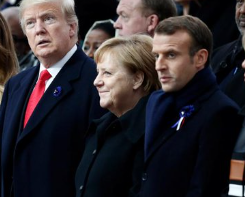
(Photo : X.com)
- European leaders are preparing for the complexities of Trump's second term, focusing on the future of EU-US alliance.
- Macron and Scholz seek a coordinated European response to Trump's return, emphasizing the need for a "stronger Europe.".
- Trump's proposed 10% tariff on all imports is a major concern for Europe's export-dependent economies.
- The focus is on strengthening European autonomy and ensuring its own security in the face of potential challenges and uncertainties.
As the dust settles on the US presidential election, the world watches with bated breath. Donald Trump's historic victory has elicited a range of reactions from world leaders, particularly those in Europe. While formal congratulations have been extended, European leaders are also bracing for the complexities of a Trump 2.0 era, considering the potential implications for transatlantic ties.
The day after Trump's victory, around 50 European leaders convened in Budapest for the fifth meeting of the European Political Community. The future of the EU-US alliance under Trump's leadership was a central topic of discussion. French President Emmanuel Macron voiced concerns, stating, Trump was elected by the American people. He will defend American interests... The question is whether we are willing to defend European interests. It is the only question.
Macron's remarks underscore the cautious approach of the bloc as it prepares for the potential challenges of Trump's second term. European Council President Charles Michel emphasized the enduring alliance and historic bond between the 27-nation bloc and the United States. European Commission President Ursula von der Leyen underscored the importance of the true partnership that sustains millions of jobs and billions in trade and investment on each side of the Atlantic.
Navigating the Trump 2.0 Era
However, von der Leyen's team has reportedly been preparing contingency plans for months, including potential retaliatory tariffs on U.S. imports should Trump impose new duties on European goods. Despite Trump's previous threats to withdraw the United States from NATO, new NATO Secretary-General Mark Rutte offered a message of support, saying Trump's leadership will again be key to keeping our Alliance strong.
Macron pledged readiness to work with respect and ambition, and German Chancellor Olaf Scholz affirmed that Germany and the United States would continue to collaborate for the well-being of our citizens. Amid these statements, Macron and Scholz reportedly conferred privately, seeking a coordinated European response to Trump's return. Both leaders emphasized the need for a stronger Europe within this new context.
British Prime Minister Keir Starmer voiced confidence in the country's enduring special relationship with the United States, though media reports suggest his team is bracing for possible trade frictions akin to those foreseen by EU leaders.
The Road Ahead for Europe
During Trump's first term, his America First doctrine placed considerable strain on US-EU relations, sparking disputes over trade tariffs, NATO funding, and US withdrawals from landmark agreements like the Iran Nuclear Deal and the Paris Climate Accord. Analysts warn that his comeback could become a Trumpian nightmare for Europe, especially given the strife of his first administration with the bloc and his campaign promises.
One of Trump's proposals -- a sweeping 10-per cent tariff on all imports -- looms as a major concern for Europe's export-dependent economies, particularly in the automotive, luxury goods, and machinery sectors. In 2023, the EU exported 502 billion euros (about 542 billion US dollars) in goods to the United States, according to Eurostat. Goldman Sachs forecast that such tariffs could weaken the euro by up to 10 per cent, further pressuring the eurozone and diminishing Europe's global competitiveness.
Trump has been a staunch critic of Europe's defence spending, repeatedly urging NATO members to increase their contributions. Former NATO Supreme Allied Commander James Stavridis suggested that Trump might push European nations to allocate as much as 2.5 per cent or even 3 per cent of GDP to defence -- an imposing burden as Europe contends with the prolonged Ukraine crisis, a situation many see as linked to NATO's eastward expansion under US administrations' continuous push.
* This is a contributed article and this content does not necessarily represent the views of btin.co.in









